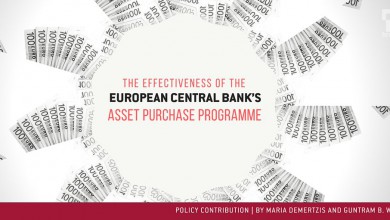This Policy Contribution was written for the Informal ECOFIN Meeting, Bucharest, 5 April 2019. The authors look at the EU’s economic agenda, discussing the priorities for the next five years. It can be downloaded HERE. My speech as given to the EU Ministers and Central Bank Governors is HERE.
The European Union can look ahead at the next five years from a good economic position. Employment is comparatively high, the recovery has been uninterrupted for several years and income inequality remains less pronounced than elsewhere in the world. But the EU faces nevertheless formidable economic challenges. In the short-term, there is the potential for strong macroeconomic weakening, resulting partly from uncertainty generated by the global trade conflict. The EU also has a long-term growth and productivity weakness. Finally, the EU, especially the euro area, suffers from a lack of convergence and its social cohesion is threatened.
The EU must put together a European growth strategy that focuses on innovation while addressing climate change and improving social cohesion. Growth requires investment, research and innovation. While the current debate on industrial policy is welcome, the EU should be careful to maintain, or even improve, the conditions for growth in Europe and must avoid falling into the protectionism trap. To achieve its climate goals, the EU must ensure that its consumption and its production become greenhouse-gas emission neutral by 2050 or earlier, implying a massive transformation of all economic activities. This will pose major economic and social challenges. Distributional concerns will therefore have to figure prominently in this transformation. More generally, the benefits of growth need to be distributed more fairly in our societies. While social policy is and should remain a national responsibility, the EU needs to ensure that the single market, a key asset to promote growth and economic well-being, does not undermine the ability of countries to raise taxes on capital income, wealth and inheritance. A rising tax burden on the working middle class might have already become incompatible with Europe’s social market economy.
Convergence in the EU and in the euro area is a necessity: the European growth strategy cannot be blind to sustained regional growth differences. An EU in which economic growth does not spread through all of its major regions will be politically challenged. The paradox is that many of the policy instruments to address this problem remain in the hands of national policymakers, even though the way they use them has significant implications for the rest of the EU. The EU supports convergence through its budget and technical support but the fundamentals of this paradox remain. In the euro area, further measures are needed to address some of the systemic causes of divergence. In particular, it is imperative to complete banking union and for capital markets to become more integrated, since a well-functioning financial system is fundamental for growth.
A euro-area safe asset would bring benefits but is difficult to establish. EU fiscal rules need to be reformed to improve the macroeconomic management of the euro area. A euro-area budget and more responsive national fiscal policies are important tools to better respond to cyclical downturns. Finally, the relationship between the euro area and non-euro area countries needs to be addressed.


